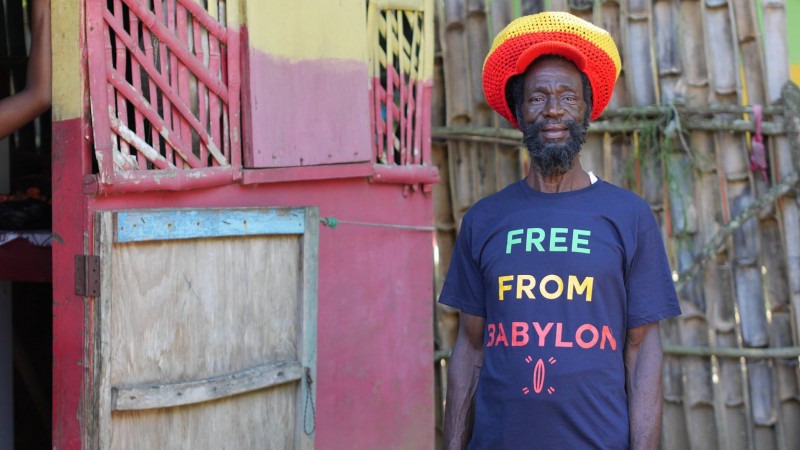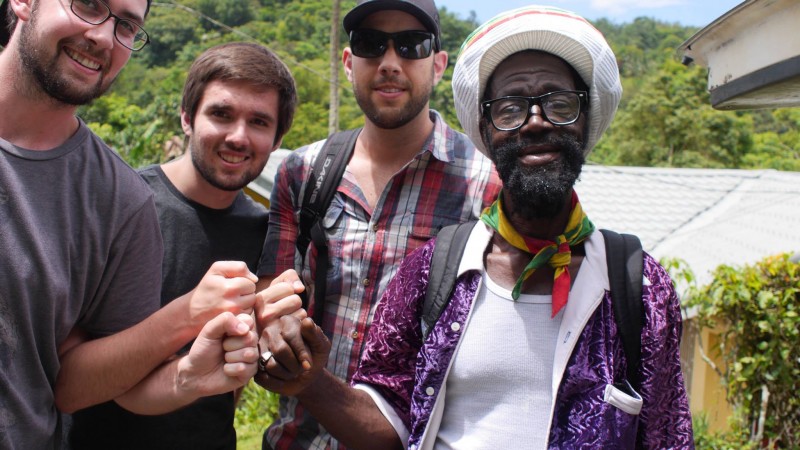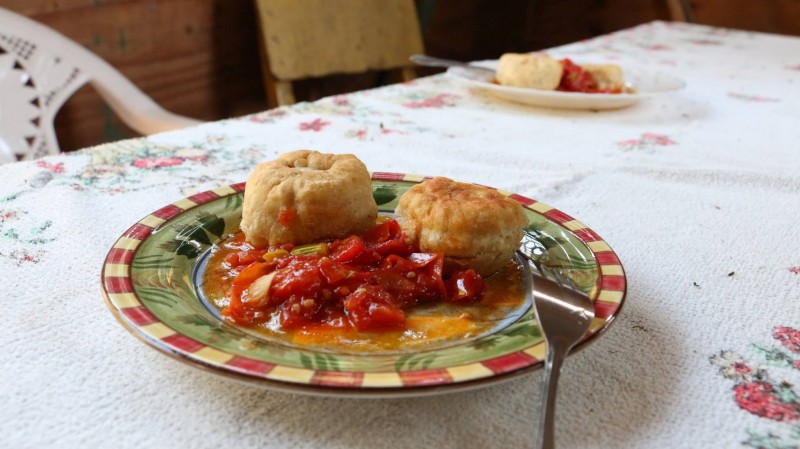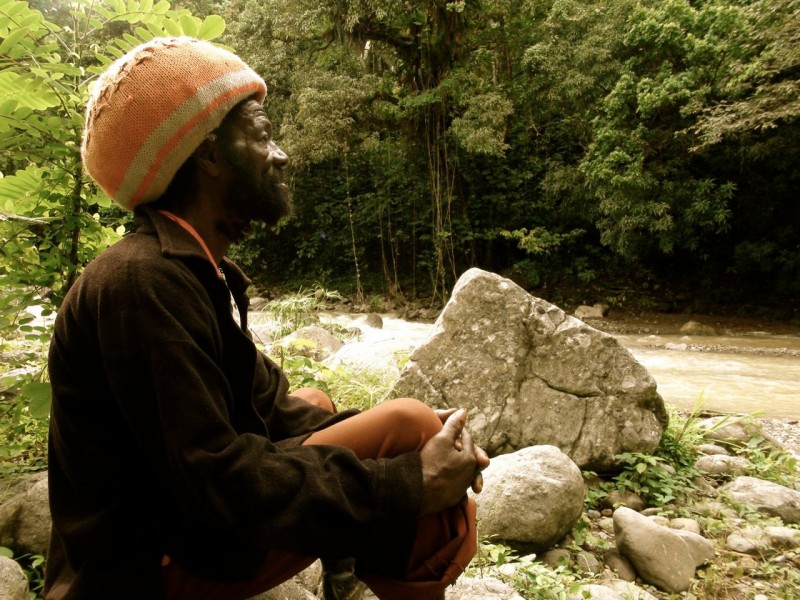 [1]
[1]Ras Mokko, Ital chef extraordinare of the cooking show ‘Ras Kitchen’. All photos in this post are courtesy the show and used with permission; photo credits to: Eric Leece, Mike Zakrzewski, Matt Viveen and Matt Pancer.
On any given day, deep in the Blue Mountains of Jamaica, there is a Rastaman cooking up a meal — perhaps a little bit of rice and peas [2], maybe saltfish in a pot on an open fire.
He may look like an unconventional cultivator to some, but Ras Mokko Jackson's cooking is pretty much the norm for any old school Rasta in his country — the difference is that he has his own cooking show.
Mokko's distinct Ital [3] shack stands out because there's literally no other cooking show/documentary like it on TV or the webisphere [4].
Everything he cooks comes from his organic farm, a local natural food shop or is just a hike away. Ras Kitchen [5] creator, Matt Pancer, stars with Mokko in the show, which is an entertaining offering, filled with comedy — and Mokko's expletives.
In a chronicle of events stemming back from 2010, they give viewers a look at what it is like to cook organically and with a sense of adventure!
So, what is Ital food?
First of all, it is part of the Rastafari movement; a way of life. Much more than just the Rastafari religion, it is a culture which is also a component in the Nyabinghi Mansion Rasta group [6].
Many think that the major aspects of being a Rasta consist of smoking marijuana and eating vegetables, but Mokko eats chicken and different kinds of fish. Everyone follows their own Ital diet to increase Livity [7], the Rastafarian term for energy — the life force that flows through all human beings.
Ital derives from vital, which makes perfect gastronomic sense, since food is necessary for life.
Global Voices got a delicious chance to step inside the Ras Kitchen and talk with Matt and Mokko.
 [8]
[8]Crew Photo, taken by taxi driver Danny — (L-R): Mike Zakrzewski, Matthew Viveen and Matt Pancer in Sunning Hill, Saint Thomas, Jamaica. Photo used with permission.
Global Voices (GV): How did you come up with the idea to create a Rastafari/Ital cooking show and why'd you decide to roll with Mokko?
Matt Pancer (MP): Growing up I was really into jungle music, dub, reggae, ska…all of those styles of music coming from Jamaica. The music was always infused with Rastafari elements, but I really knew almost nothing about the actual culture. I had been making videos for years and really wanted to create a unique TV show that could have global appeal. I’d been researching about Rastafari and read about the concept of Ital food, and that’s when the idea hit me. A REAL cooking show with a true Rasta cooking Ital food in an old school way.In 2010 I was looking everywhere online to see if I truly had an original idea. I couldn’t find any video online showing this at all. Theres a lot of Jamaican cooking shows, sometimes making Ital dishes, or guys with dreads, but they were all done in nice, clean, indoor, modern kitchens. Eventually, I found a site called ‘Worlds Together Travel Network [9]‘, which connects travellers with cultural travel experiences. You can stay with a Mayan family in Belize or a Bedouin family in Egypt. Sure enough, there was a page about staying with a Roots Rasta family in Jamaica. There was a short clip of a Rasta man making a stew on an open fire…and that man of course was Mokko. It had a phone number…so I called him and asked if he would be open to myself and a friend coming to shoot a cooking show with him for a week. He said ‘Ya Man!’
GV: Would you ever consider writing a cook book?
MP:I’d love to do a book with Mokko's recipes. The thing is though, that Mokko cooks from the heart…he doesn’t time anything, measure anything…it’s all done by intuition. So it may be hard to write a book without these details.
GV: What would a typical day be like for a traveller staying at Mokko's Riverside Cool Cottage and Ras Kitchen?
Mokko Jackson (MJ): Cook and all those things and hike, go all over the place, you know. I will take all my guests there.
MP: The accommodations have tripled since the first time I was there in 2010.
 [10]
[10]“Some serious gourmet business at Mokkos…every single time” — in Sunning Hill, Saint Thomas, Jamaica. Photo used with permission.
GV: Do you plan what you're going to cook for the show?
MP: There are NO plans at all. Mokko is not a big planner. Most mornings we get up at sunrise and just figure things out from there. As a show director/producer, this makes things very difficult, but that’s how he rolls and I have to go with it.
GV: How many years have you been cooking?
MJ: I start to cook when I was about…12 and all around there, you know…as a little youth growing up. [I learned] from my mom [and] I always cooked for her, you know? I always loved the cooking and there's lots of places in Jamaica I go and cook and a lot of guests love it…Portland…everywhere. People call me, to do it for them, even to make Ital, yah know!
GV: Tell us about the shooting and editing process and working under certain weather conditions.
MP: We have been to Jamaica three times to shoot now — usually with two to three people — which is an extremely small crew, but we make it work. This last trip I did just this past October, I did solo. It was a huge challenge as I had to do everything…operate three cameras, do all the sound, producing, directing, media logging. I just have to flow with it…see what Mokko feels like cooking that day and go along with it. It’s a lot more like shooting a documentary than a cooking show…I just have to be ready for anything.
We cook in the outdoor kitchen on an open fire, which doesn’t make things easy on the technical side. There’s a metal roof which makes the lighting hard to work with, the smoke from the fire is getting directly in my face sometimes. If it rained the day before, you can be getting eaten by mosquitos. Fire ants love to bite the feet of camera guys who are paying attention to the camera and not where they are stepping…sandflies, rain, heat, the list goes on.
Editing takes a lot of time since I do everything myself. If there was a bigger budget for the show, I’d be happy to pay a crew to do some or all of it. Even the subtitles take a while to put in.
GV: What has the online response been like?
MP: Online response has been amazing. It’s been a slow build, but the people that like the show are very engaged. It’s building more and more each month. There are viewers from all over the world. I was actually surprised at how many Jamaicans love the show…both expats and those still in the country. I thought that they wouldn’t be as interested, as they would have seen this kind of thing before. But what I found out is that many Jamaicans love the show because it reminds them of the old days, maybe their grandmother used to cook on an open fire just like Mokko does today. Or for those in Jamaica , they might see a Rasta on the street, but they’ve never spent time in their yard before. Although Jamaica can be a rough place, there is so much beauty in the people and the nature there. I think people everywhere can enjoy that.
GV: Why did you choose online as the ‘broadcast’ avenue? How measurable has it been — can you track your hits and learn more about your target audience?
MP: Originally I had envisioned it on TV. I had shot a pilot, pitched it to Food Network [13], OLN [14], Omni [15], tons of places. The general response was ‘Wow this guy is really unique and cool…but this is not mainstream enough.’ They thought it could be good for a one-off special, but no way could it work in a series. Fair enough, it’s a very niche thing and it’s definitely not for everyone! Having to subtitle everything was a problem in their eyes too. I then spent a lot of energy pitching it to online networks…all over the place, and got very little response. I even partnered with a team in Los Angeles to help pitch it to venues in the US to no avail. I was actually surprised, as I know we really have something original here, it’s never been done before. So after many rejections, I just stopped trying to pitch it. Not because I had given up on the idea, but because I don’t feel like I need the validation from a bigger company. Things have changed so much in the TV/online content world in the last five years, why can’t I just make this happen myself? Conventional TV is a dying breed. There is a growing core group of fans that really enjoy the show and that’s who we make Ras Kitchen for.
GV: How has social media helped your cause?
MP: Social media [16] has been a great way to communicate with fans of the show. We don’t have huge numbers yet, but those that do are heavily engaged. I’d rather have 10,000 engaged people watching than a 100,000 that just click once and watch 30 seconds of it.
A video we put up recently (Herbs of the Yard Tour) was pirated and put up on someone elses Facebook page without my authorization. It had 20,000 views and 500 shares within a couple days! The original video on the Ras Kitchen YouTube page still has less than 2,000 after weeks! At first I was kind of pissed, but then I thought at least this gives some validation that it is something unique that people are interested in seeing.
GV: What has been the best part about this whole experience and what have you learned from each other?
MP: The best part is just hanging out with Mokko. He’s such a character, we have a ton of laughs and I love hearing all his stories. I get to feel like part of the family when I’m there. I also felt a real connection to my food source. We had to climb, poke, throw, forage, trade, or grow our food. In cases where we couldn’t get it that way, we would buy from local people who Mokko knew. Being thoughtful of where the food came from, how long it took to grow, the effort it took to bring it to the table is something I’m guilty of not considering very often. It brings a new appreciation to the source of energy in our lives.
GV: What do you want people to take away from the show? What are you trying to accomplish by sharing the Ital cooking approach with the world?
MP: I just want people to see something real. The common misconception is that Rastafari […] has all kinds of rules and regulations that need to be followed to be a real rasta. It’s not like that…it’s an individual journey for each person. Ital can also mean different things to each person…it’s not something rigid with firm rules like Kosher [18], for example. I’d love for people to take away an appreciation of Mokko’s culture, the beauty in simplicity, and start to think about where their food and energy comes from. The more aware we are of this, the more we can start to build more sustainable ways to feed ourselves and take care of our planet.


